Peter MALONE
Saturday, 18 September 2021 19:23
Tempest
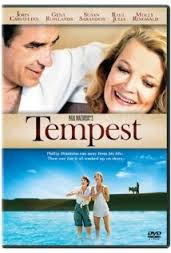
TEMPEST
US, 1982, 136 minutes, Colour.
John Cassavetes, Gena Rowlands, Susan Sarandon, Vittorio Gassman, Raul Julia, Molly Ringwald, Sam Robards.
Directed by Paul Mazursky.
Tempest was directed and co-written by Paul Mazursky. Mazursky has shown himself an interesting, if idiosyncratic, writer director - Bob and Carol and Ted and Alice, Blume in Love, Harry and Tonto, An Unmarried Woman, Moscow on the Hudson.
This is an adaptation of Shakespeare's play, playing on the names of the characters and the situations and trying to insert them into contemporary American society. The audience will be either intrigued by the straight-out plot-line or be trying to check the parallels between Mazursky's version and Shakespeare's. Cinematic effects are used to indicate magical powers, storms etc. (An interesting parallel would be Derek Jarman's 'punk' version of Shakespeare's play, The Tempest (1980)). The film stars John Cassavetes and his wife Gena Rowlands who work well together. There is a strong supporting cast with Raul Julia especially interesting as Kalibanos and Molly Ringwald as the young daughter. Photography was by Australian cinematographer Donald Mc Alpine.
1. The background of Shakespeare's play and its themes: age, wisdom, serenity? The older man as magician, escaping from society? His wonderful daughter and youthfulness? Fairies, goblins? Power and control? Shipwreck? Confrontation and reconciliation? Mazursky's use of the plot outline, adaptation, updating? Language and visuals? Comparisons of 17th. and 20th. century? Grandeur and modernity? Poetry, symbolism, magic? The value of the updating? The theatrical finale?
2. The impact of the visuals and music: New York, Greece, cities, islands, water, serene beauty, the storm? The effects of magic and the storm? The location photography, colour, contrasts? Flashbacks and the ending? The score and the range of songs, their insertion into the action, the final Manhattan theme? Editing?
3. The film in Paul Mazursky's filmology, a focus on characters, crises. relationships? The contribution of the stars?
4. 20th century interest in mid-life crises, the pressures of city life. the need for escape, nervous and marital breakdown, the search for self, into self? Rebellion and honesty? Pride and confrontations, forgiveness? The effect on the younger generation?
5. The psychological background of the film: the search for self and into self? Symbols: city, dreams and drowning, the dog, action, healing, women - wife, daughter (sexuality, celibacy)? An island location? Shadow themes? Storm and purging? Dance? Confrontation and unification?
6. New York life: traffic, Broadway, parties, party talk, relationships, apartments and the brittle life? Atlantic City and the world of gambling? Opting out - and the quality of the return? The playing of Manhattan (and the aerial photography?
7. Lifestyle: wealth, celebrity, the world of art, architecture, Atlantic City and the casinos, the building industry? The visuals of the buildings - to what purpose? The pressure of Alonzo and his henchmen? Freddie? Theatre and parties? Planes, the doctor, comic touches, accountants? Bewildering life, purposeless? The possibility of illness, death? The medical background and 20th. century concern about health?
8. John Cassavetes as Philip/Prospero - as a man, his age, arty, not listening, bond with Antonia, clash, his love for Miranda and seeing her as a 'kid'? Alonzo as boss? Death and his plummeting? Health, drinking? Relationships, kissing and dancing?
9. His decision to go to Greece: searching for his roots, the decision with Antonia, Miranda? The encounter with Aretha? Talk, infatuation? The key? Celibacy? The clash with Antonia, the cafe? The move to the island, the year? A new life, the presence of Aretha, celibacy? The encounter with Kalibanos? Violence? Miranda and the day? The amphitheatre? The dramatic importance of the film opening in Greece and moving to flashback from this point?
10. The day: talking with Aretha, the fighting and the drowning of Kalibanos, memories of Kalibanos? Miranda? The dog? Baseball and his arrogance? The wreck, his wrath, knowledge, tempest magic, urging the storm, purging and forgiveness?
11. Antonia: as woman, wife, type? Her marriage, love for Miranda? Her acting career, the party, her fear of hate, the fight, the liaison with Alonzo? Travelling with him? The scenes in Athens? The yacht and the breaking with him? The wreck and reconciliation? Forgiveness and union?
12. Miranda - child, outspoken, television, parties, the fights? Her relationship with her parents? Athens and approving Aretha? The island, yearning for TV, the innocent swimming, Kalibanos following her? The discussions with Aretha about sex? Gunsmoke? The encounter with Freddie, sexual awakening? The phone number? The ending?
13. Aretha and her story, in Athens, singing to tourists? Israel? Songs, pleasant? Love, sexuality, help, talk? Reconciliation? Helping Alonzo? Her future?
14. Alonzo as the entrepreneur, boss, Mafia-type connections, push, casinos, buying people? The doctor, the plane? The liaison with Antonia? Power, presence in Athens, the boat, the breaking with Antonia, the shipwreck? His relationship with Freddie and its effect on him?
15. Freddie and his relationship with his father, his story, infatuation with Miranda, lyrical sequences, reconciliation?
16. Harry and his being bossed around? The doctor and his style? Comic characters? Their being hangers-on, the experience of the shipwreck, on land, Kalibanos, the dancing?
17. Kalibanos and the background of Shakespeare's evil and comic character? His place on the island? Threats, television, infatuation with Miranda? The drowning and his memories? The cave? His song and dance to New York, New York? The tourists? Forgiveness?
18. The girl and Gurdjieff?
19. Philip's father and his influence on his son? Talk, age, greying, alone? Codes? mid-life crisis?
20. Themes of power and belief? Control, self-control? Love, celibacy? Themes of paradise - possible or not? Utopia? The storm and tempest theme with forgiveness and reconciliation?
21. Fantasy, reality, dream? Healing?
Published in Movie Reviews
Published in
Movie Reviews
Tagged under
Saturday, 18 September 2021 19:23
Telethon
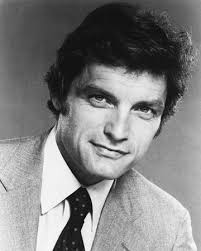
TELETHON
US, 1977, 90 minutes, Colour.
David Selby, Red Buttons, John Marley.
Directed by David Lowell Rich.
Telethon is a typical (and quite enjoyable) telemovie. It resembles many television series e.g. Love Boat. There are the usual number of stars in glamorised and heightened situations. This time it is the conducting of a telethon at Las Vegas. Everybody has problems. These are explored and come together (generally happily) at the end. The character actors are quite good at this kind of thing and invest their performances with perhaps more than they are worth e.g. David Selby and Red Buttons and John Marley. Direction is by David Lowell Rich who has directed so many of this kind of
film. Worth studying as an example of the typical American telemovie of the '70s.
1. Audience interest in and enjoyment of telemovies? The artificial and heightened plots? The gallery of characters quickly introduced, their crises indicated and explored, happy resolution? The background of soap opera and popular enjoyment of it? The human treatment of characters instead of mere emphasis on action? The strengths and weaknesses of the telemovie? The humanity and the cliches?
2. The colour photography of Las Vegas? The Dunes Hotel? The artificial glamour of the city in the middle of the desert? Its sinister gambling and violent undertones? The background of television production and its artificiality? The telethon - for charity yet playing on the sentimental values of Americans and the giving of money? The public image of entertainers and stars and the reality? The musical score? The star cast?
3. The audience the film was pitched at? Audience at home? Relaxing? A presentation of life yet situations larger than life? Fulfilling expectations? Helping audiences to understand different personalities and lifestyles from their own?
4. The film's emphasis on Las Vegas and its glamour as well as its ugliness? Crime? Mafia? Violence? The casinos? Contracts? Television world covering Las Vegas - and its unreality? The contrast with Matthew and his growing of cactus plants etc.?
5. The world of television, fast talk and promotion, phoniness? Telethon and celebrities using their images? Getting promotion? Exploiting the audiences?
6. The gallery of characters - the star interpretation of the role, the brief sketching of the character, the crisis, melodramatics, interactions, resolutions?
- Marty Rand and his reputation, comic style, TV personality, running of the telethon, the clash with Mrs. Goodwin and telling her off, his friendship with Roy, the discovery of Kim and his trying to keep her quiet, trying to help her, the clashes between the two, trying to get stars for the show, the threat of the end of the telethon, his living on his nerves, his managing at the end and doing what he did best?
- Kim and her arrival in Las Vegas on the bus, searching for Marty Rand, ringing, meeting him, telling him the truth, the background of her alcoholic mother, wanting to discover her father, her dependence on him, Roy's showing her round, her disappointment in seeming to be brushed off, the prospect of school, the confrontation between the two and his explanation of himself as a part-time father, her love for her father and her future?
- Roy and his family background, the Mafia, gambling, love for his family, the pressure by Tommy, his attempts to gamble and his being banned, trying to borrow from Marty and having his friendship, Arnie and his refusal and the irony of his being the contract, his accepting the contract only to warn Arnie. his gambling with Arnie's money and gaining his respectability, the clash with Tommy, Arnie's death?
- Tommy as the young Las Vegas hood, pressure on Roy, suave style, his explanation of his capacity for killing, his being defeated by Arnie and Roy?
- Arnie and his gambling background, jail, reaction against the Mafia especially with the attempt on his life and that of his wife, his pushing his weight around at the hotel, his wanting to do good, the encounter with the prostitute and her son.. her saving his life, his trying to reform her, visit her home, give her son presents, the air ticket, his being the target for the contract, his helping Roy, confrontation of Tommy, his death? His having a good influence before he died?
- Charlie and his work as Marty's manager, liaisons with his secretaries, his wife discovering him, the smooth talk, trying to arrange things, the callow producer?
- Mrs. Goodwin and her intensity, organisation, devotion to cause as well as to charity, her obsession about the cause. clash with Marty, reconciliation? Matthew and his fight, being an alcoholic, friendship with Elaine, the meal together, the night together, his discovering of the truth, the possible partnership, the clash, his coming to rescue Elaine - prospects for the future?
- Elaine and her money, giving it to charity, the television interview with Mrs. Goodwin, her loneliness in the hotel, her going for a walk, Charlie trying to pick her up, the chance encounter with Matthew, the evening, her hesitation, as an alcoholic, the final partnership and happy ending?
- The Las Vegas hooker and her work, saving Arnie's life, being oppressed by him, the encounter with Arnie at the pool, the present for her son, the ticket her grief at his death? Another happy ending?
- The management of the Dunes Hotel and their obsession with money. the threat to the telethon's future? The guest stars e.g. Jimmy Walker and Sugar Ray Robinson appearing? References to other stars?
7. How well did the film bind the characters and situations together? Sustaining audience curiosity and interest? The happy ending - what was the audience left with?
Published in Movie Reviews
Published in
Movie Reviews
Tagged under
Saturday, 18 September 2021 19:23
Telefon
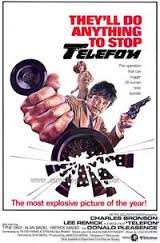
TELEFON
US, 1977, 103 minutes, Colour.
Charles Bronson, Lee Remick, Donald Pleasence, Sheree North.
Directed by Don Siegel.
Telefon is a spy thriller. Spy thrillers are staple entertainment diet and this one is modestly entertaining. Charles Bronson stars, but it is not exactly a Bronson vehicle. Age and respectability are creeping up on him and he is using his wits rather than brawn for a victory. Supported by Lee Remick and a yet again maniacal Donald Pleasence, he must break a KGB sabotage plan in the U.S. where agents, long planted, can be activated hypnotically by telephone. While the plot is far-fetched (I hope!), it provides excitement and some literally explosive action sequences. The CIA, personified by Tyne Daly, testing computer hypotheses is quite interesting . Director is Clint Eastwood's mentor, Don Siegel.
1. The appeal of espionage films? International backgrounds, Russia and the United States, plots? Action drama? Espionage issues of right and wrong?
2. The film as a Charles Bronson vehicle? The appeal of the star? His credibility in the role of a top ranking Soviet official? His skills, uncovering the plot?
3. How credible was the plot? The background of American/Russian relations in the early 60s? The nature of the conspiracy? The passing of time and the different approaches in international affairs? The secrecy of the Telefon plot? The diplomacy needed to defuse it? The inherent violence of the plot and the visualising of the acts of sabotage? The danger for further sabotage and the breaking down of international peace? Or was the plot too highly contrived - the hypnotizing of the sabotage agents, the way that they were activated, their deaths?
4. The visual impact of violence, the destruction of the installations and the way this was portrayed - and the irony that so many were outdated? The quality of the special effects? The deaths of the agents themselves and reactions to this by the media? By the C.I.A.?
5. The theme of having people as agents - when they had volunteered, undergone their training? The perfect assimilation into the American way of life? The number of people involved, their range of occupation, from mechanic, to priest, to housewife? Their giving of their life? The visualising of the telephone calls, the poem, the hypnotic effect and the hypnotic behaviour?
6. Grogori - the introduction to him in Russia, his qualifications and skills, personality, memory? The humane themes of his way of life in Russia in the apartment, the children playing? The fact that he was usable and was to be used? The importance of secrecy? The attitudes and the personalities of the top ranking K.G.B. officials? The building up of his cover, arranging the helps in the United States? The irony of C.I.A. information about him? The detective work, the journey, the tracking down of the various people? The tracking down of Dalchimsky? Strengths and weaknesses of character, the relationship with Barbara, professional, love?
7. The introduction of Barbara as Grogori's help, her guiding him through difficult situations? The irony of her connections with the C.I.A.? The sharing of dangers? What was the revelation of their killing the priest in hospital and the ruthlessness of the mission? How credible was it that Barbara should be a double agent?
8. The gradual unfolding of the plan - Dalchimsky and his motivation, his character, memory? Seeing him in action with the various phone calls, the manic quality of his mission? His presence in the town and his observation? The gradual narrowing of the distance between Dalchimsky and Grogori?
9. How well did the screenplay illustrate the cat and mouse game, the varying locations, the difficulties for Grogori, eg. the fight in the mountains? The gradual coinciding with Dalchimsky?
10. The parallel with the C.I.A. especially in its work with computers? The personality of Dorothy Putterman and her enjoyment of working with computers? Espionage in the 70s and the world of computers?
11. The presentation of the Russian hierarchy, their plan, characters?
12. The personalities of the agents - and their violence eg. Stark, Father Miller and his death, the attention given to Marie wills and her leaving her home in dressing-gown, digging up the implements, the explosion and violence?
13. The atmosphere of killing? Dalchimsky?
14. The ironic need for self protection by Grogori and Barbara? The way that they were able to hold out against the K.G.B. and the C.I.A. with their names and the nature of the poem for the Telefon conspiracy?
15. Human issues, personal relationships, the contemporary world in international espionage and terrorism, the threats to world peace, the types of personalities involved in espionage?
Published in Movie Reviews
Published in
Movie Reviews
Tagged under
Saturday, 18 September 2021 19:23
Tell Me that You Love Me, Junie Moon
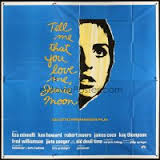
TELL ME THAT YOU LOVE ME, JUNIE MOON
US, 1969, 108 minutes, Colour.
Liza Minnelli, Ken Howard, Robert Moore, Ben Piazza, James Coco, Anne Revere.
Directed by Otto Preminger.
Tell Me that You Love Me, Junie Moon is based on a novel by Marjorie Kellog who wrote the screenplay. It has, in turn, been praised and hated by critics. The film studies three physical and social misfits and should have called for audience sympathy and understanding. but the result is too frequently a garish and breathless rush at significant drama. The fault of the film does not lie with the actors, and their work makes the film worth seeing. Liza Minnelli is good as the scarred Junie Moon, a shallow good-time girl, whose facial disfigurement changes her life and gives her an opportunity to develop her character and her generosity. Ken Howard is a gentle epileptic from an orphanage. Robert Moore is an irritating and catty homosexual cripple from a rather bizarre and loosely moralled background. Together they set up a home and try to reach some kind of working normality.
Preminger uses technical gimmicks to illustrate his characters' past -long narrative for Junie Moon's acid scars; sudden memory flashes for the cripple; elongated screen fantasies for the epileptic. The film is seriously marred at the end with a preposterous confidence trick holiday for the three and a sentimental love and death ending. Solutions
are open to moral questioning as well. Many moving moments make a disappointing film worth consideration. The director is a man of spectacle and lavish dimensions - Exodus, The Cardinal, In Harm's Way.
1. Are you satisfied with the cinema treatment of the struggles for the three misfits? Does the film's tone seem appropriate?
2. What is the relevance of Pete Seeger's singing 'Old Devil Time' as a framework for the film? His walk through the woods? The words of the song?
3. How do people become misfits and freaks? What do they contribute and what do people (e.g., suspicious neighbours) make them? How different are Miss Gregory and her neighbours?
4. Junie Moon - what kind of character was she before the incident? Admirable, ordinary or shallow (note her reaction to her mother)?
5. Was the cemetery scene convincing, and in good taste?
6. How did her character change after the incident? When she left hospital? Bitterness? Sense of responsibility? Giving and needing love?
7. Was she any better as a person for having suffered?
8. Arthur - discuss the strengths and weaknesses of his character, Diffidence, feelings, sensitivity, responsibility.
9. What effect did the type of flashback used have - Arthur in colour, everything else is elongated grey and black? Would the effect have been different if it were in plain narrative style?
10. Discuss his love for Junie. Was it real, or contrived by the screenplay? Was his death convincing, or did it seem artificial?
11. The cripple - his character. was it explained by his origins? Why was he so mean, petty, catty, nagging and self-centred? What were his attitudes to the dying negress, Giles, the black beach boy, Miss Gregory taunting him to walk? Did he achieve anything by the end of the film?
12. Mario - what was the effect of his kindness? The holiday - was it realistic or symbolic or a contrivance? The necessity of such a swindle (how funny was it)?
13. Were you satisfied at the end of the film? Would you have handled the story differently?
Published in Movie Reviews
Published in
Movie Reviews
Tagged under
Saturday, 18 September 2021 19:23
Teen Wolf
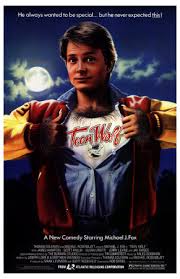
TEEN WOLF
US, 1985, 91 minutes, Colour.
Michael J. Fox, James Hampton, Jerry Levine.
Directed by Rod Daniel.
Teen Wolf looks like an '80s variation of I Was A Teenage Werewolf. However, commentators noted that it was more a Jekyll and Hyde story and related it to Jerry Lewis's The Nutty Professor.
The film is a piece of high school nonsense, reminiscent of so many high school films of the '80s - especially Michael J. Fox's telemovies High School U.S.A. and Poison Ivy. However, the film has a great deal of charm and relies on the compelling presence of Michael J. Fox. Made before Back to the Future, it was released in the aftermath of the extraordinary success of that film and did very well.
Fox is an ordinary teenager at high school, has a sympathetic girlfriend but hankers after Pamela the blonde. He clashes with her boyfriend. He clashes with the headmaster. Eventually he discovers that he and his family are werewolves. The film doesn't highlight much of the werewolf theme - rather it enjoys its possibilities (especially on the dance floor, at basketball,. with the girls). James Hampton enjoys himself as the father. Inconsequential - but entertaining.
1. An enjoyable teenage comedy? Americana? The American family and high school? Teenagers? The werewolf themes -played for laughs?
2. The portrayal of the American town ' homes and streets, teenagers' activities? School? Drama, basketball? Dances? The contemporary musical score and the songs? The memories of songs of the past?
3. The title and its focus? On Scott as a teenager? As human, the animal within him? Repercussions on peer group?
4. The portrayal of Scott - Michael J. Fox's presence and charm? At the basketball and losing, his range of friends, his liking for Boof? His not seeing her charm but wanting Pamela? The clashes with Pamela’s boyfriend? The clashes with the basketball coach? His behaviour at dances, games? Parties? The change in himself - the long hairs, the voice changing when he wanted to buy. the beer? The transformation in the bathroom and the special effects? The humour at seeing his father as a werewolf? The discussions about the family, his mother, the rivalry with the teacher? His decision to go out as a wolf - and his turning into a wolf and back to himself? The change in the basketball games, the dance floor? Pamela attracted towards him and being seductive? His going on the van around the town with the music? His friends? The school's fan club? The clash at the bowling alley? The friends thinking that he was a freak, moving away from him? His dilemmas - and wanting to be him self? The final decision to be himself, the team gaining energy and winning the match? A hero by himself? Reconciliation with Boof?
5. Scott's father, his shop, genial, bringing his son up, seeing him as a werewolf, the heart-to-heart talk, the clash with the teacher? The happy ending?
6. Boof as the good friend, the party and in the closet, her disappointment at Scott's infatuation with Pamela? Pamela and her self-consciousness, seductive attitude towards Scott, her own boyfriend? Her being abandoned at the end - though gently?
7. Scott's friends, their getting about together, the party, the promotion of the wolf, the raucous friends? The fat friend? Lewis and his moving away? The basketball team? Finally getting together behind Scott?
8. Nick and his tough attitudes, jealousy, clashes with Scott? The victim of the wolf?
9. The Coach and his attitude towards his hopeless team, his inane comments, his reaction to the wolf?
10. The sketch of people around the town, the school? The reaction to the wolf - cheering the celebrity? The ironic quick acceptance of Scott's wolf character - making it part of school life?
l1. A pleasant variation on werewolf themes?
Published in Movie Reviews
Published in
Movie Reviews
Tagged under
Saturday, 18 September 2021 19:23
Taxi Driver
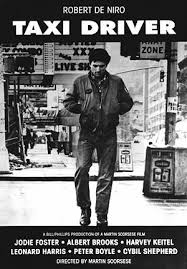
TAXI DRIVER
US, 1976, 114 minutes, Colour.
Robert De Niro, Cybil Shepherd, Jodie Foster, Peter Boyle, Harvey Keitel, Leonard Harris, Martin Scorsese.
Directed by Martin Scorsese.
Taxi Driver is one of the more important films of 1976. It is a grim picture indeed and one that would have limited popularity. It would have far more impact in America than it would elsewhere. On the technical side, one can note that the film was directed by an up-and-coming younger director, Martin Scorsese (who played the jealous husband cab passenger in the film). His previous film, Alice Doesn't Live Here Anymore, has also been discussed in these volumes. Prior to that he made Mean Streets, which is akin to this film. Mean Streets has been released in Sydney but not in Melbourne.
The actor in Taxi Driver is Robert De Niro, who also featured in Mean Streets. In the meantime De Niro appeared in the Marlon Brando role in The Godfather Part 2, and won the Oscar for his performance. He is supported in this film by Cybil Shepherd of The Last Picture Show and Daisy Miller, and by Jodie Foster, a 13-year-old who played an opposite kind of role in Echoes of Summer and appears in the gangster musical, filmed solely with children, Bugsy Malone. The striking musical score for the film (which, indeed, contributes so much to the atmosphere) was by Bernard Herrmann who completed the score a day before he died in December 1975. Herrmann wrote the score for Citizen Kane and for many Hitchcock films. The credits for Taxi Driver are most impressive.
But the theme is also impressive. It takes up the problem of the lonely and isolated American male. The Taxi Driver himself, who cruises in amongst the ugly features of the impersonal city, while distanced from it as an observer through his windscreen, is a good symbol of the problem. The driver lives alone, in a dingy apartment, finds it hard to relate, tends to degrade what is good while striving to rescue from evil. He also shows symptoms of neurosis. These culminate in the striving for self-assertion by the American weapon, the gun, and its consequent violence. Observers have commented on how accurate the film is in the presentation of the lonely American male and in its insights into his character and needs.
1. The films acclaim and awards? The work of Martin Scorsese, Paul Schrader? The combination of their different backgrounds for a parable of contemporary America? The film as capturing and communicating the atmosphere of the United States in the '70s?
2. The New York setting - the overtones of Midnight Cowboy, Andy Warhol and his observation of "low life" in the city? The impact of the credits sequence - the steam from the streets, the gliding of the taxi, 42nd Street, the range of people seen, the abstract patterns of the neon lights and their reflections? The contrast with the ordinariness in daylight of streets, politicians' offices, campaign headquarters, skyscrapers? A recognisable and unrecognisable New York? A symbolic New York?
3. The importance of the score - the jazz theme, the pounding themes? The use of sounds, silence - especially the taxi gliding without its motor's noise and silence or musical substitutes?
4. The importance of movement with the photography, the many tracking sequences and the style of tracking, the gliding of the car, Sport and Iris' dancing, overhead shots and tracking? A sense of continued movement? Slow motion work? The audience moving through this world of New York, with Travis and observing him?
5. The colour photography, the subjective camera and Travis' point of view? Travis being observed? The kaleidoscope of colour especially at the end? The patterns of colours and the use of mirrors e.g. Betsy in the back of the taxi? The use of films and television? The collage of the colours and lights of the city?
6. The use of the taxi driver as a symbol: American, the American male, macho attitudes? The car and its mythology of the extension of the person? Travis' renting the taxi, it being a vehicle for people that he carried - as a symbol of the people he carried within himself? The mythology of gunmanship? The lonely and isolated and alienated American male? The ideal of womanhood and her need to be loved, rescued? The taxi driver as the detached observer of life in the city: the focus on Travis' eyes, the subjective shots, the use of the windscreen, mirrors? Travis moving through this world? The impersonal aspect of the taxi driver – the complaining husband and his talking to the back of Travis' head? Palantine and his comments about learning about Americans from taxi drivers? The credits and the presentation of the taxi and its cruising the streets?
7. The introduction to Travis as a character - his head and eye movement? His observation? Sanity, suggestions of paranoia and obsession? Madness? The significance of his diary and seeing him compose it, hearing his rendition of what he was writing? What did it reveal about himself and his day, attitudes towards life, health and pains, his obsessions, his reflections on the ugliness of New York? The family background and his sending the card for his parents' anniversary? The information about him when he applied for the taxi licence, a device for introducing him? His education, background of work, Marine service in Vietnam? The effect on him? His capacity for work, accepting any passengers. the long hours because of insomnia? What type of American male did he represent - alone and isolated in the city? His apartment? His recreation in going to the pornographic films, his buying the sweets, watching television? The fact that a taxi driver need not relate to others even though he be courteous and serve them?
8. The introduction to Betsy? The WASP woman ideal? Her being shown at work. her devotion to Palantine and his cause, her interest in American politics? Her dress. manner of speaking. poise? Her relationship with Tom and working with him? The comic touches with the presentation of Tom and his spying on Betsy and Travis? Her talk with Travis after seeing him watch her and Tom's getting rid him? Her fascination with him? Her quoting Kris Kristofferson and seeing him as part prophet, part pusher - a sign of contradiction? What motivated her going out with him, her listening to his psychological analysis of their relationship? Travis' comment on the outing and what they ate in his diary? The continued outings, taking her to the film and his having no criteria as to decide what should be seen? His reassuring her, her walking out and the rupture between them? The continued phone calls - and his speaking to her and the camera's moving to the empty corridor? The break between the two and her not being present in the office? His glimpsing her at the rallies? How well could she be understood in the light of the cause of Palantine? What he represented in American politics? His values and the rule of the people? His interested talking to Travis in the taxi and the attitude of his aide? His speeches? A victim for an assassination attempt? A winner?
9. The contrast with Iris and Betsy? Similarities of appearance? The ideal woman the woman to be redeemed and rescued? The first short sequence of her being taken out of the taxi and the money dropped on the seat (and Travis' holding on to this bill)? His bumping into her in the street with his taxi, his following her along the street with her friend? His picking her up, their discussion, the encounter with Matthew and his suspecting Travis to belong to the police? The crudity of Matthew's description of her proficiency as a prostitute? Her going upstairs and leading him on in the prostitute's manner? The symbolism of her room especially with the lighted candles? Her sexual behaviour, her age? What did she bring out of Travis in his. understanding of her, his comment on her age and what she should be doing? Her understanding that he was trying to rescue her? Her going to the cafe with him? The sharing of their values, what they had in common. reflecting on life and their weirdness? Her presence during the shooting and the reaction? The fact that he did rescue her and her parents were grateful?
10. The presentation of the taxi drivers, their talk. preoccupation with sex, passing the time between jobs? Wizard and his experience, his earnestness in trying to answer Travis' questions but his incoherence and his platitudes? The reappearance of all the taxi drivers at the end indicating things were back to normal?
11. The build up by Robert De Niro of the character of Travis? How skilfully did he communicate his actions and what was going on in his mind? The diary, the many scenes alone, the pains in his head. his fear of madness and the need for breaking out? His tirades against the scum and the filth and his fostering these by watching them? His explanation to Palantine of the need to cleanse the city? His going into training and the physical rigours? His explanation of himself to Betsy, his self-perfection themes? His obsession with cleanliness? (And the symbolic use of water, rain and the need for the washing clean of the city?) How much was revealed by the characters that he picks up in the taxi especially the obsessive husband who made him look at his wife and her black lover silhouetted in the window? The suggestions of Magnums killing people? The taxi driver asking whether he had a gun and the build-up to his being armed?
12. When did Travis get the idea of using violence, his sense of mission to cleanse the city by self-assertive violence and its recognition? The long sequence of the conman? The advice about? the Indian warrior style?
13. What drove him then to the rally, his previous watching of Palantine, his smiling moving up after applauding the speech? Betsy's presence, Palantine's words? The failure of his attempt and its repercussions for Matthew and the others?
14. The character of Matthew and his work as a pimp and audience lack of sympathy? The importance of Travis' use of the gun in the supermarket and his shooting the robber dead? (And the audience being prepared for his violence by the shooting but also by the senseless bashing of the victim by the shop-owner?) The confrontation with Matthew and the shooting of him, Matthew's shooting of Travis? The emphasis on blood? The importance of the use of colour and the bleaching of the sequences so that the impact of blood was not so shocking and realistic? The effect of the stylising? The shooting of the janitor, Iris, client? The use of all weapons, guns and knife? Iris and her presence? The overhead shot of the slaughter with the police arriving? The attention to violent detail in the shooting of the finger etc., the ear? The long recapitulation of the violence in the room and on the stairs? The audience response to such prolonged looking at the blood and violence? Travis having achieved such violence and its bursting out of him, being shot and almost dying? His being in the position of a death with his finger mimicking the gun? The audience being led to believe that he was dead?
15. The impact of his being raised to life - the device of Iris' father reading the letter, the tracking around the room with the information from the news cuttings about his recovery, his heroism? The irony that his madness was interpreted as cleansing heroism?
16. The strange normality after all these events and shocking violence with his talking to Wizard and the other drivers, his conversation with Betsy and her return to him, his letting her off.. his driving off into the blurred kaleidoscope of New York lights and colours?
17. Themes of violence - the intense build-up of the violence which is within people and needs a catalyst for its relief and release? The peace at coming to terms with violence? The type of temperaments that are prone to violence? His strict religious seeming attack on filth? And yet Travis' inability to distinguish good films from the pornographic? The importance of the obsessive personality? How did this symbolise American violence and its expression? A comment on the permissive society and vice? The importance of the influence of the Vietnam war? Do people have to explode in order to be healed?
18. How much religious background was there to this fable and symbol of modern America? The "Christ figure" tones of Travis in his wanting to redeem people and cleanse? His dying in order to redeem? His being raised to a new kind of life? Betsy as the ideal woman, Iris as the sinner to be redeemed?
Published in Movie Reviews
Published in
Movie Reviews
Tagged under
Saturday, 18 September 2021 19:23
Taste the Blood of Dracula
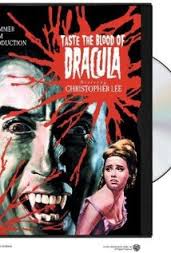
TASTE THE BLOOD OF DRACULA
UK, 1969, 95 minutes, Colour.
Christopher Lee, Geoffrey Keen, Gwen Watford, Linda Hayden, Peter Sallis, Anthony Corlan John Carson, Ralph Bates.
Directed by Peter Sasdy.
Taste the Blood of Dracula is one of several Dracula films made by the Hammer Studios at the end of the '60s: Scars of Dracula, Dracula Has Risen From The Grave. It once again stars Christopher Lee who reinterpreted the role during the '50s and '60s - and the role became strongly associated with him. Screenplay is by John Elder, writer of a number of the Hammer horror films. There is a particularly strong British cast. Director Peter Sasdy directed a number of the horror films of the period e.g. The Beast Must Die. Effective of its kind.
1. The popularity of the Dracula myth? The various versions - from the '30s and Hollywood to Hammer Studios in the '50s and '60s? The atmosphere of dream and nightmare? The living dead and devil-figure? The sensationalised material for the popular audience?
2. The English setting, period, the country town, homes and estates, the contrast with the bordello in the East End of London? The church, the ruins etc.? Lurid and dark colour, special effects especially for Dracula and for the deaths? Musical score? An authentic atmosphere for this kind of horror film?
3. The conventions of the genre: the evil man who becomes Dracula, Dracula and his symbols. behaviour. murder, lust? The villains? The romantic heroines - some vampirised, some freed? The heroic young man? How well were they put together here?
4. The dreamlike nature of the plot? Plausibility? The respectable English gentleman? Their severity in their homes? Their going to the bordello? The agreement with Lord Courtley? The ceremony? Dracula, his persecutions, killing the three gentlemen? The defeat of Dracula and the conquering of love?
5. Christopher Lee as Dracula: presence, appearance, style? Sinister evil living dead presence? violence and lust? Lord Courtley and his depravity and his deal with the businessmen? His becoming Dracula? The build-up to the confrontation and Dracula's defeat?
6. The characterising of the three men and their households, especially Hargood and his severity with his daughter, his hold over his wife? Paxton and his daughter? His son as the hero? Secker and his final relenting before death? The British character actors and the strength of the drawing of the characters?
7. Paul as conventional hero? Alice as persecuted heroine? In danger from Lucy? mesmerised by Dracula? Her killing her father with a spade? Lucy and Alice and the contrast in fate? Jeremy and Lucy's vampirising him? His killing his father? The symbol of family relationships, love and hatred?
8. The minor characters and their contribution - Martha Hargood, Roy Kinnear's comic style as Weller? The people in the village? The persons in the bordello?
9. The working out of the melodramatics - victims, predators, murders? The violence of the villain's death?
10. The contribution of this kind of entertainment to the perpetuation of the Dracula lore?
Published in Movie Reviews
Published in
Movie Reviews
Tagged under
Saturday, 18 September 2021 19:23
Tarka the Otter
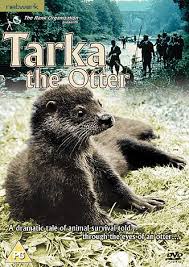
TARKA THE OTTER
UK, 1978, 87 minutes, Colour.
Peter Bennett, Edward Underdown, Brenda Cavendish, Reg Lye, narrator: Peter Ustinov.
Directed by David Cobham.
Tarka the Otter is based on a nature classic by Henry Williamson, published in 1927. The film version was written and directed by David Cobham in collaboration with naturalist author Gerald Durrell. The film is beautifully photographed and shows in detail the life and doings of otters. The setting is Devon and a canal and various bridges and the river going down to the sea. The animals, while personalised and having names, are not treated as characters acting out a story but rather are described by the continuous plain narrative spoken by Peter Ustinov. This has the advantage of not sentimentalising the animals and making us observe nature. However, it also has a somewhat distancing effect and the film often seems like a documentary. The film is attractive and informative for family audiences.
1. The entertaining and education value of this kind of story, send -documentary? For what audience was it made? How did it communicate its content - plot, information, emotional appreciation of the otter and its world?
2. The semi-documentary overtones - the value of having the narrative, as spoken by Peter Ustinov? Information, personalising the otter and its life? A detached and observer's view of the otter?
3. The qualities of the colour photography? Realism, observation of nature? The poetic presentation? Underwater photography? The importance of the editing for pace and presentation of nature? The location photography - Britain in 1927, ponds, rivers. the ocean? The contribution of the semi-classical type of score?
4. The importance of presenting the otter's life in a parallel way with that of humans? Audience interest, identification, sympathy? The otter as rodent and therefore repellent? The observation of the life of the otter and audience interest in this - struggles, survival, achievement? The tracing of the otter's life - the bitch otter being spared in the hunt because of her pregnancy, the birth of Tarka (the little water wanderer)? Tarka’s father being killed in the hunt, the mother's death from the farmer? Tarka and his birth place, the otter and their swimming down river to the Atlantic, the estuary, the encounter with the salmon fishermen, the rabbit hunters and the chase by the ferret? The encounter with the female otter White Tip? Rivalry? Tarka's returning home to the pond? The farmyard situation? Having to survive through winter? Tarka swimming up the Torridge River to its source? The reuniting with White Tip? Their home together at Canal Bridge? The bearing of the three cubs? The return of the hunting season? The previous hostilities with Deadlock? Tarka being given four minutes grace, the hounds chasing? Tarka’s refuge on the mill wheel. his being hounded, cut off. Deadlock and Tarka's duel under water? The death of Deadlock? The parallel with human situations?
5. How was Tarka presented as hero - character, the descriptions? His behaviour? White Tip as heroine? Deadlock as villain?
6. The importance of the humans - the salmon fishermen and their being bitten and their hostility towards otters, the hunters and the chase? Otters as animals to be hunted?
7. The background of nature - its beauty, perennial laws, the survival
Published in Movie Reviews
Published in
Movie Reviews
Tagged under
Saturday, 18 September 2021 19:23
Taras Bulba
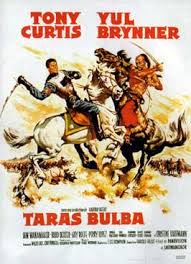
TARAS BULBA
US, 1962, 122 minutes, Colour.
Tony Curtis, Yul Brynner, Christine Kauffman, Sam Wanamaker.
Directed by J. Lee Thompson.
Taras Bulba is costume adventure for undiscriminating audiences. However, it is colourful, shows something of Cossack life and the impact of the Cossacks in the 16th century. Tony Curtis performs acrobatics in battles. Yul Brynner acts as the Cossack patriarch. Dialogue is somewhat stilted and gives the film no pretensions to being more than enjoyable action for younger audiences.
1. Was this film enjoyable as an adventure, glimpse of history, epic and costume drama?
2. The atmosphere of the credits with the background of painting and classical music? The use of Panavision and colour? The Argentinian locations for central Europe? The music, the atmosphere of the battles.. the pageantry? Audience response?
3. How well did the film communicate the historical setting? The 15th century clash of east and west? The Poles defending Europe? The reliance on the Cossacks? The threat of the east, power on the Steppes of Russia?
4. The picture of Polish arrogance and betrayal? Prince Grigory losing his hand after the treacherous speech? The snobbery of the Poles with the Cossacks in the town? The hostility and battles? How convincing were the villains?
5. The contrast with Cossack pride? Owning the Steppes, feeling at home. wanting a homeland? The emergence of Taras Bulba as leader? Yul Brynner's style? The sequences of rough life, home life, propensity for fighting. drinking. singing and enjoying life? The civilization of the Cossacks?
6. The contrast with the city? Education? Learning and the Polish civilization?
7. Taras Bulba's pride in his sons? Tracing the growth of them all, especially Andrei following in the footsteps of his father? The sequences of their mutual fighting? Taras Bulba wanting them to be educated?
8. The picture of education? The cruelty and discipline of the Poles? How much did they learn?
9. The interludes of love and romance? Was this well done, realistic? Comment on the daughter of the Governor.
10. The inherent danger - how did this come to a head? Audience interest and suspense?
11. The siege of the city and the hardship. the plague? The Cossacks divided amongst themselves?
12. The dramatic importance of Andrei's betrayal. his torture? The threat of death to Natalia? Andrei's own death and its significance? Why did Taras kill his son? what did it mean to him?
13. The theme of the unified Cossacks and the unification with the Poles? As a basis for European nationalism?
14. How serious was the film meant to be? How much a comic-book adventure?
Published in Movie Reviews
Published in
Movie Reviews
Tagged under
Saturday, 18 September 2021 19:23
Tam Lin
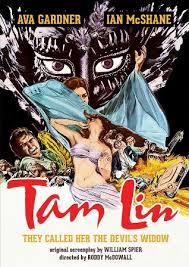
TAM LIN
UK, 1971, 106 minutes, Colour.
Ava Gardner, Ian Mc Shane, Richard Wattis, Stephanie Beacham, Cyril Cusack, Sinead Cusack, Joanna Lumley.
Directed by Roddy Mc Dowell.
Tam Lin is the hero of an old ballad, bewitched by the Fairy Queen. The ballad story is updated to the swinging '60s - with psychedelia and boredom. The film does not work particularly well - it has lavish treatment: Panavision photography, effective performances from Ava Gardner and Ian Mc Shane. The film is the only one directed by Roddy Mc Dowall. It had very limited release. It seems something like an attempt to give an English version of Federico Fellini’s La Dolce Vita with the themes of Michelangelo Antonioni. As such, the film is a well-made curiosity item.
1. Audience knowledge of the Ballad of Tam Lin: Tam the young man bewitched by the Fairy Queen? The world of the fairies and its magic? Enchantment for good and evil? Tam and his being ensnared? The inevitability of death - unless escape to the outside and being saved by goodness? How well did the film adapt the ballad? The contribution of the songs and the lyrics?
2. The screenplay adapting the ballad to a 1960s "realistic setting"? How realistic? How real? How involving and persuasive? Moralising? The film as an updating of the ballad to be a morality play? A fable?
3. The contribution of Panavision colour photography? The atmosphere of affluence? Homes, cars, clothes? The background of Scotland? The mansion? The village? The comparisons with the city? The special effects, the use of colours, montages? The score?
4. Ava Gardner as the Fairy Queen? As Mickey? Her court - her likes and dislikes, whims? Her parasites? The black man? The behaviour of her entourage - idle, pleasure-seeking, self-indulgent? Superficial and chattering? Her entourage on the move? The cars, the mansion? Her control over the group? The attempts at psychological enchantment in the "realistic" setting? Her ensnaring Tom into this particular atmosphere? The contrast with the good as personified by Janet? The greater selfishness of the Queen? Her hold on Tom? The sexual relationship? Her evil and Elroy's revelation of her past? Her beauty, power, possessions, sensuality, sexuality, jealousy, violence? Her potions and her control of life? Murders? The credibility of the motivation? The irony of her failure? The breaking of the spell? The contemporary equivalent of the ballad Fairy Queen?
5. Tom - the ordinary young man, his being ensnared into the court, his involvement, participation in the activities? The sexual dependence on the Queen? His wanting freedom? His encounter with Janet and the montage of their meetings? Their being trapped by Mickey? The church? His change of attitudes? Growing responsibility? The cards and fortune? The week with Janet? The potion? The chase and his survival? The symbol of the ordinary man getting another chance?
6. Janet as heroine? goodness? The pup, the fifty pounds? Her being snared in the plot? Mickey's disdain of her? The encounter with Tom, the meeting, the seduction? Her father and his religious background? The abortion? Her being saved? Her going away, the chase, the crash? The true love and the influence on Tom? Saviour figure?
7. Elroy and his sinister presence, service, evil, malice? The background of homosexuality?
8. The minister and his helping, the nature of his preaching, h-is inability to help?
9. Oliver as the new rival, waiting, biding his time, his influence with Mickey? The elaborate setting up of the murder game? Confronting the Queen?
10. The superficial world of bright young things, aimless parasites? The witches' coven? Her control of their behaviour? Evil, games, frenzy?
11. Tom, the potion, the test. his endurance, his struggle for freedom, his control?
12. For what audience was the film made? A film of the '60s? The attempt at a contemporary morality play?
Published in Movie Reviews
Published in
Movie Reviews
Tagged under